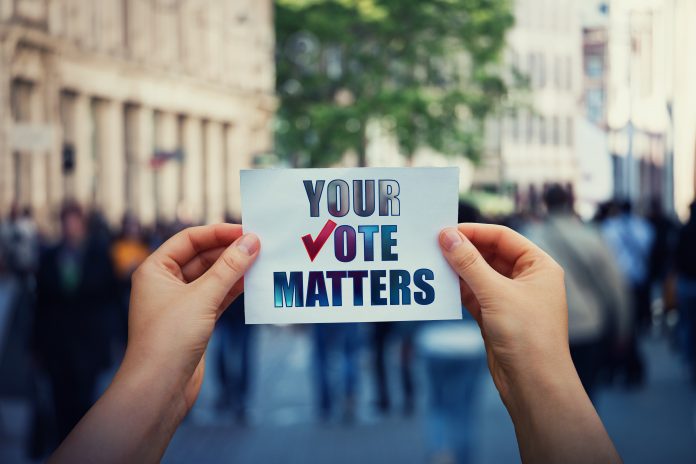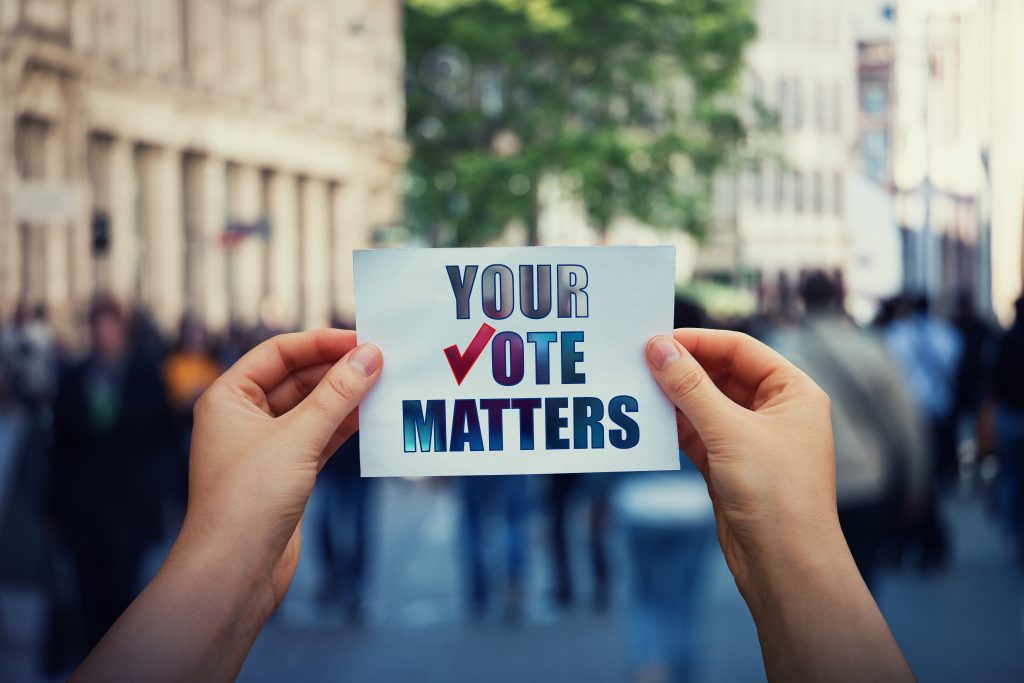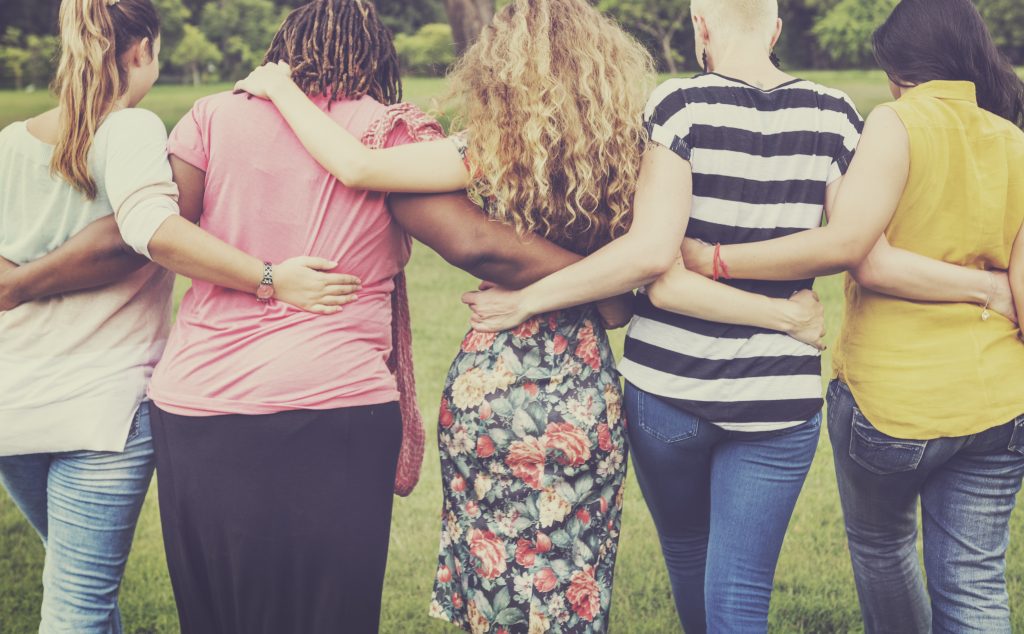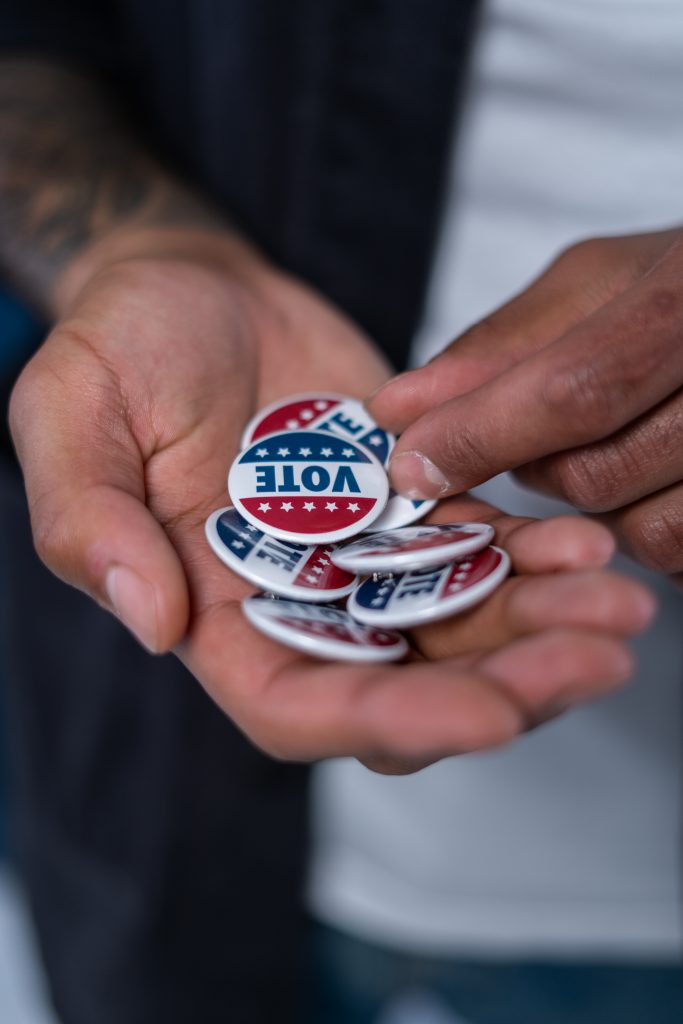
Did you know there’s an election happening this year? And that people have strong feelings about it?

Every time I click on a social media app, I see videos and memes and strongly worded rhetoric. A good friend of mine posted her support for one candidate on a social media account and had over three hundred (at times vitriolic) comments in less than twelve hours. In a year where life has followed an increasingly unstable course, we’re all invested in what comes next.
My friend’s unintended social experiment reveals a not-so-secret truth – we want people to agree and vote with us.
In an election where so much is at stake, we may feel that people who don’t agree with us are going to cause the downfall of democracy. We may think they’re morally bankrupt, or self-interested, or just plain stupid. The detachment of communicating through a screen instead of face-to-face makes it that much easier to drop the niceties and go for the jugular.
However, no matter how much we disagree with the comments we see online from our family, friends, or that one kid that sat three seats behind us in calculus for one semester, it’s crucial that we remember people are more complex and nuanced than the parties or issues they support.
When each of us (hopefully!) casts our vote on election day, we’re not signing our names to an unalterable ledger of right or wrong or becoming a facsimile of the people we’re voting for. We are simply weighing our options among a myriad of different factors and making the best choice we can.
One of the greatest gifts I’ve received from military life is the opportunity to experience different people in different parts of the United States. I spent my childhood and young adulthood in Arizona, Idaho, and Utah. Virtually everyone I knew aligned with the Republican party, and the virtues of conservative politics were extolled at the dinner table or in the car, where Sean Hannity and Rush Limbaugh’s voices echoed over the radio until my dad gave in to my sister and my pleas to turn off talk radio.
All of this changed when my husband and I moved to Los Angeles so he could attend graduate school. As he started classes, I began working on a pediatric cancer unit close to downtown.
It was a jarring cultural shock for me. I’d spent my entire life around mostly white people who went to my church, were in the same economic class, and had the same political beliefs as my family. But now, I was spending hours each day with people whose life trajectories were vastly different from mine. People from all over the world traveled to that hospital in hopes of finding a cure for their child’s illness, and as I got to know my patients and their families, I realized just how limited my experience of humanity had been.
As I worked at the bedside for twelve hours a day and spent hours in patient rooms:
- I had conversations with people who had experienced poverty, who were struggling to pay their child’s medical bills, or who didn’t have clean homes to return to once their medically fragile child was discharged.
- I learned how to accommodate religious customs for families staying in the hospital.
- I learned how to communicate through an interpreter (and made valiant but unsuccessful attempts to apply my single semester of medical Spanish).
- I talked and listened while watching for allergic reactions to blood transfusions, drawing labs every fifteen minutes to check chemotherapy levels, or patiently trying to spoon food into a child’s mouth who hadn’t eaten in three months due to nausea and mouth sores from their chemotherapy.
We talked, and I learned that many of the views I’d taken for granted needed to be examined.
After four years of dental school in California, my husband began his active duty service as a dentist in the Army.
We spent a year in Washington state, then two years in North Carolina. Now we’re stationed in a Georgia town just south of the South Carolina border.
We’ve bounced between extremely blue and extremely red states.
I’ve gotten to know people who are passionate activists for Black Lives Matter and people who can’t stomach voting for someone who promotes abortions. I’ve met people who voted for Donald Trump reluctantly, believing his policies would serve his or her family better than another candidate. I’ve met people who attend Donald Trump rallies with enthusiasm. I’ve met people who would rather amputate a limb with a dull knife than vote for Donald Trump.
Do you know who I haven’t met? I haven’t met any sociopaths or serial killers. I haven’t personally associated with any people that are burned up with hatred or the desire to do violence to someone else.
I know those people are out there, and I think we can unequivocally agree that harming another human being is wrong. Hatred has no place in society. But I genuinely believe that most of the statements we see made on social media from the people we love and care about are not coming from a place of hatred or ill intent.
We may feel they are misled. I often disagree with the opinions I see voiced. Sometimes, I see friends and family members explaining a viewpoint they support, and my mind is blown. How can they believe that? I wonder. How can they not see how incredibly wrong they are?

On really good days, sometimes I actually get to talk to these people that I disagree with and we are able to have a productive conversation.
These conversations almost never change my mind. While occasionally someone makes a point that I hadn’t considered, I’m a woman who has done her homework. I’m engaged politically. I’ve weighed the risks and benefits and come away with what I think is the right choice.
So why engage at all?
Because of these conversations, I see those people are human. I go from shaking my head and thinking, How can that person be stupid enough to support something I disagree with? to thinking, That still doesn’t ring true for me, but I understand why that issue is important to them and why they think this is the best way to proceed. It restores people from jeering caricatures to complex human beings with unique experiences and motives.
I know it’s not always that simple. Many policies and statements contain deep layers of hurt, and there are actions that can actively cause harm on both sides of the aisle. But I genuinely believe that nearly all the people we imagine cutting off, the ones we mute or unfollow or we dread talking to at family dinners, are real, good people that are worth engaging with, even when it’s hard.
There are many issues at play in any election, and different people will prioritize them in different ways. Maybe you’re especially passionate about immigration, or police reform, or family leave. Your friend or family member may be concerned about the survival of their small business, or health insurance for a loved one, or education opportunities for their differently-abled child. What may be a cut and dried choice of right and wrong for one individual may be an extremely complex and nuanced decision for another. There are dozens of elements at play.

You don’t have to agree with everyone or their vote. You won’t agree with everyone.
But we grow stronger as individuals, communities, and a nation when we recognize that someone can vote differently from you with integrity. Nearly 250 years ago, our country fought a war in part to grant you and your neighbor the ability to vote for what you believe are the best outcomes for this country. You don’t have to agree with them. You don’t even have to understand where they’re coming from. Just try to remember that they are people with their own humanity, even if their actions or words leave you doubting it.










